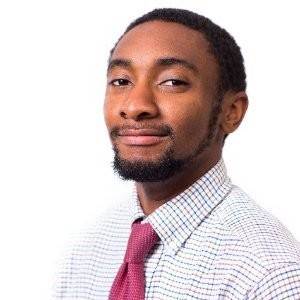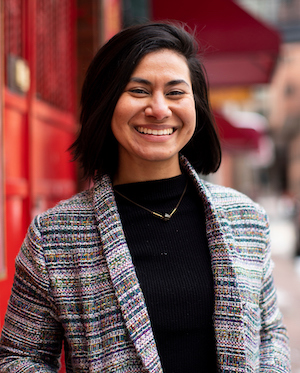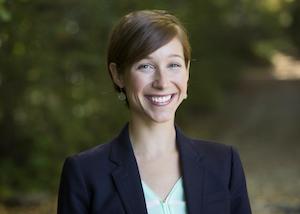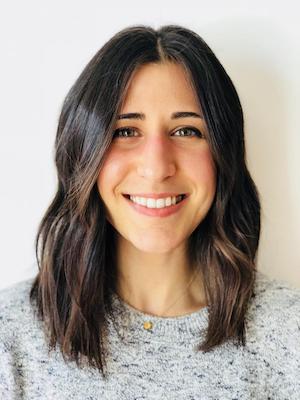Friedman School Faculty, Students, Staff, and Alumni perspectives
Read more about perspectives on diversity, equity, and inclusion from members of our community. To read reflections, click on the links below.
Brandon Morgan, M.S.
I graduated from the Friedman School in 2017 with an M.S. in Food Policy and Applied Nutrition. Today, I work for the LEAH Project at Health Resources in Action (HRIA). LEAH stands for Leaders through Education, Action, and Hope. We help youth of color prepare for college and introduce them to the academic realm of STEM, working to break down barriers that have historically made it difficult for students of color to participate fully in that sphere. We connect students with internships and help them pursue careers in the biomedical field.
During my time at Tufts, I received the Albert Schweitzer fellowship. Through that, I worked at Boston Public Schools teaching about nutrition and social determinants of health. Upon graduation, I got a job teaching English. I have always liked to teach and enjoyed that role– but I missed the Public Health aspect, so I transitioned into my current job with HRIA.
I know what it feels like to be a person of color in STEM. Beyond more obvious barriers and disadvantages we sometimes face, there is an additional challenge of isolation. I wanted to support an easier way forward for other students of color, and I find my job fulfilling. Social justice is inherent in my work, which I enjoy.
I also interned with Childhood Obesity 180 while I was at Friedman. I completed a literature review regarding how to reach out to communities disproportionately impacted by childhood obesity. This spoke to me because of the focus on health equity, and it provided a backbone for thought leadership in other spaces. Friedman offered me very strong training in hard skills. In the future, I would like to see the school offer more classes and trainings about the soft skills needed to serve a community.
I stay connected to Friedman in some ways. At times, Friedman students have come to HRIA to speak to our youth. We strive to bring guests that are relatable for our youth in some way. This can be challenging because the Friedman community is growing slowly in racial diversity. When I was a student there, I found it helpful to connect with other people of color. I felt the strongest sense of community through my fellowship, because all of the folks I was working with were committed to serving our communities.
Nayla Bezares, PhD Candidate
I am pursuing a PhD in Agriculture, Food, and Environment. Before I came to the Friedman School, I worked in the food industry. In my engineering job at General Mills, there was a disconnect in the way I interacted with food personally versus professionally. Also, being from Puerto Rico, I was struck by the fact that the foods I chose at my local co-op differed so significantly from what was available at home. While fruits and vegetables are available there, the variety is limited. Because about 90% of food is imported, many common items are shelf-stable rather than fresh. Wanting to get out of the factory setting a little bit, I began to volunteer at a school in Milwaukee. Milwaukee is a very segregated city, and I was working to help inner-city kids reconnect with nature. Unfortunately, outdoor recreation is whitewashed, and lots of people of color lack opportunities to engage with it. I brought food into this conversation to help students engage with their surroundings.
Part of my work is examining the pervasive assumption that local or regional food is the best for everyone. I have been able to confront and examine this presumption with a critical lens because of my background. If people in Puerto Rico did not import food, their diets would be lacking in variety. When we talk about US Agriculture, we tend to focus on the continental United States. Since Puerto Rico is a U.S. territory, it is part of the American food system and should not be forgotten in these conversations. I’ve been able to bring this kind of unique perspective into the classroom at Friedman. Outside of the classroom, I’ve conducted research on farmer resilience in Puerto Rico. One challenge I have faced is a lack of credibility. Folks in Puerto Rico are often unfamiliar with Tufts, so they don’t realize the caliber of the work we are doing or the potential for us to effect change based on our findings. Nonetheless, I’ve learned a lot from them. The island lifestyle holds unique challenges for sustainability. For example, 11 of 27 landfills in Puerto Rico have recently closed because they have reached capacity. Limited land, water, and other resources mean that people living on an island have no choice but to adjust to a more sustainable lifestyle. I hope to use my Friedman training to continue to help address these issues.
Dr. Nicole Tichenor Blackstone
I am an Assistant Professor in the Division of Agriculture, Food, and Environment at the Friedman School. My work is centered around developing and assessing strategies to improve food system sustainability. I consider sustainable food systems to have four core dimensions: environment, social, economic, and health. I use tools from industrial ecology, nutrition, and the social sciences to analyze food systems and diets. My research intersects with social justice by bringing data on the social risks in food supply chains to growing global conversations on sustainable diets. Social risks include issues of labor exploitation, health and safety, gender equity, and human rights, among others. Social risks of foods can be estimated, not unlike a carbon footprint. Now is a critical time to transform global food systems to remain within planetary boundaries; we must also ensure this transition reduces inequality and advances justice.
I am currently working on a project to estimate the risk of forced labor associated with the US fruit and vegetable supply. Jessica Sparks, Associate Director of the Rights Lab at University of Nottingham and Catherine Benoit- Norris, Co-Founder of NewEarth B, work with me on this project. We are interested in this work because foods that consumers should eat more of for health reasons, like fruits, vegetables, nuts, and fish, may have high social risks in their supply chains. It’s been a valuable experience to work with an interdisciplinary team on an issue of shared concern, which is common at the Friedman School.
I co-teach a course on Corporate Social Responsibility (CSR) in the Food Industry with Dr. Sean Cash. We were able to host Dr. Benoit Norris as a guest speaker to discuss social life cycle assessment, which is one way of estimating social risks. The CSR course includes a broad array of topics, ranging from business management theories, to how companies measure the sustainability of their operations and supply chains, to how consumers respond to CSR efforts. We have learned that some evidence suggests socially responsible companies do better financially than those companies that do not prioritize social responsibility. It is possible, but by no means easy, for companies to experience both kinds of success. I also teach a course called Fundamentals of U.S. Agriculture, which focuses on history, policy, and culture, using the lenses of equity and power throughout. Understanding why the US agricultural system looks and functions as it does today requires examining history and its through line to the present, including genocide, slavery, and the legacies of those systems. Injustice is foundational to our food system, unfortunately; this must inform what we teach, how we go about creating change, and the questions we ask. By inviting students to join these conversations early on during their time at Friedman, we can begin to build the awareness, vocabulary, and toolkit required to create equitable and just food systems.
Katherine Rancaño, PhD Candidate
Katherine Rancaño is a PhD Candidate at the Friedman School whose work focuses on how parents talk with their children about weight. Conversations and comments about weight from family members, especially parents, are an important source of stigma for developing children. Such “weight talks” can have short- and long-term adverse consequences on adolescent health behaviors and well-being.
After completing her Master’s of Science in Nutritional Epidemiology, Katherine felt pulled towards her undergraduate research experiences, which focused on the evaluation and implementation of health behavior interventions that promote health equity in underserved populations. In light of this renewed focus, she applied to the Nutrition Interventions, Communications, and Behavior Change doctoral program at the Friedman School.
The motivation for her dissertation work was, in part, inspired by the conversations she experienced and observed throughout childhood. Katherine grew up in Miami, Florida and was raised surrounded by the foods and traditions of Cuba. Growing up, conversations about weight and comments about body shape were commonplace. She began to wonder how families of other racial/ethnic backgrounds talked about weight and how these conversations could influence long-term relationships with food and other health behaviors, such as physical activity.
For her dissertation research, Katherine seeks to better understand the relationship between familial engagement in teasing and negative comments about weight and the internalization of negative weight-based stereotypes in children. As part of her research she is utilizing the comparison group of the SUPPER Project, an ongoing clinical trial examining a family-based, brief, universal intervention for parents of early adolescents designed to reduce the risk of child substance use. Katherine helped design the comparison condition, which delivers an intervention focused on reducing familial sources of negative weight-based conversations and improving how parents discuss nutrition and physical activity with their child. Her dissertation will focus on examining the preliminary efficacy of the intervention delivered to the SUPPER Project comparison group.
She is currently working with the Principal Investigator of the SUPPER Project, Dr. Margie Skeer, who also serves on her thesis committee, and her thesis advisor, Dr. Aviva Must, to ensure a diverse sample of families are recruited and enrolled in the study. Her experience thus far has illustrated the massive effort that goes into recruitment, and specifically the challenges that come with reaching families from diverse backgrounds. She feels strongly that a diverse representation of families will be critical in our understanding of how families talk about weight and the potential divergent impacts of those conversations on early adolescent well-being.



